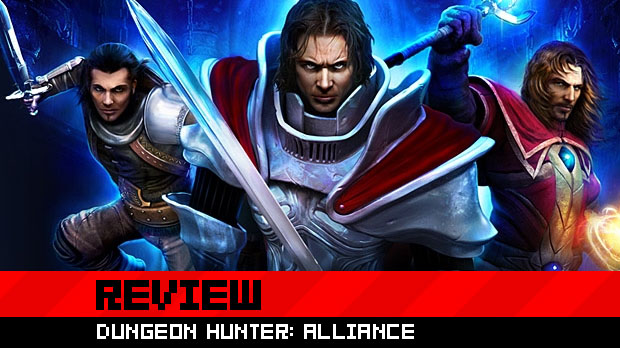Dungeon Hunter: Alliance originally came to the PlayStation Network in April 2011, where it is still available for $12.99. A few months later, the game was ported to Mac, where it has recently been on sale for $0.99.
Gameloft hasn’t stopped there, however, teaming up with regular co-conspirator Ubisoft to release another port for the PlayStation Vita. It is more or less the same game, with one major difference — it’s being sold in stores for $39.99.
There are some schools of thought that say price shouldn’t be a factor in a review, but … come on. This is being released at the same price point — and thus believes itself to be in the same league — as games like Marvel vs. Capcom 3 or Lumines. So, we’re going to judge it on that exact same level.

Dungeon Hunter: Alliance (PlayStation Vita)
Developer: Gameloft
Publisher: Ubisoft
Released: February 14, 2012
MSRP: $39.99
Dungeon Hunter: Alliance is a typical hack n’ slash roleplaying game, in the same vein as Diablo or Torchlight. As with all Gameloft games, it completely borrows its gameplay from other titles, creating an experience that walks a wafer-thin line between homage and plagiarism. Usually, Gameloft can get away with these sorts of games by keeping them on iOS and Android, where it can provide cheap emulations of bigger console games on a platform that tends to lack better alternatives. Lately, however, its decision to encroach into dedicated gaming territory has only exposed how weak some of the software is.
Alliance is no exception. As a negligibly priced iPhone app, the original Dungeon Hunter was a solid piece of disposable RPG fluff that could keep one entertained for a few minutes at a time. As a retail-priced PS Vita game, Alliance‘s mindless action, boring character progression and complete lack of narrative structure makes for game that only succeeds in making the player look for something better to do.
There are three archetypal character classes to choose from — Warrior, Rogue and Mage — each with their obvious specialties (melee combat, one-on-one quick attacks and magic, respectively) and upgradable abilities to choose from. An ability can be mapped to the square, triangle and circle buttons while X is used to perform normal attacks. In other words, if you’ve played almost any Western action RPG in the past fifteen years, you know exactly what to expect.

The world revolves around a hub town surrounded by various dungeons and spooky forests. Typical progression sees players grabbing a main quest, taking on the one or two available sidequests, then wandering into a freshly unlocked dungeon to kill things. There will be a boss at the end, who usually has some poorly written dialog (without any voice acting, naturally) and needs to be defeated to unlock the exit. The cycle then begins anew, until you decide you’ve had enough and throw the game cart into a lake.
Combat is exactly what you’d expect from a hack n’ slash RPG that hasn’t evolved from its iOS prequel. A brainless, tactless, button smashing affair, the objective is to just keep hitting stuff until everything is dead, regularly chugging down health potions to counteract the masses of enemies that inevitably swarm one’s chosen hero. Players can poke the touchscreen every sixty seconds to unleash a magical attack via their fairy (controlled with the right stick or touchpad), but otherwise, combat remains the same throughout, and it gets tiring very quickly. Stab, kill, pick up loot. Stab, kill, pick up loot.
With its stiff animations, low-res graphics and skeletal plot, Dungeon Hunter: Alliance provides no real reason for players to care about what’s happening onscreen. Combat is about as thrilling as an egg, with characters apathetically flailing at each other. Sidequests aren’t very interesting and cannot be adequately traced on the map, so they’re usually stumbled upon by accident. Not that you’d know, since everything looks so generic and indistinct that you can barely tell what’s significant and what isn’t.

To its credit, Alliance sports online multiplayer that works surprisingly well. You can choose to join a random game or host one in your own world, and character progress is universal so you can take your solo hero online while preserving quest status, experience, and equipment. I’ve only managed to get three of four available players in a game at any given time, but I noticed no lag with any of my sessions, and have little reason to believe an extra player would make a difference. The only major issue with the online feature is that sometimes the game will randomly decide to keep disconnecting you from the PlayStation Network, and you won’t be able to sign in without totally shutting down it down and restarting from the Vita home screen.
Still, it doesn’t matter how good the online features are when the game itself isn’t worth playing, and that’s the rub with this piece of software. It’s just not worth your time, let alone the ludicrous amount of money being demanded. It feels dated even by the standards of games from previous generations, and while it is currently the only Western RPG available for the Vita, there are bound to be far superior roleplaying options coming soon. This game exists simply to capitalize on the system’s launch and leech some cash from early adopters who don’t know any better.

Compared to some of the games that it has decided to price itself against, Dungeon Hunter: Alliance looks absolutely pitiful. Sitting this next to Uncharted, Army Corps of Hell or even Ubisoft’s own Lumines, exposes Alliance for the cheap, nasty, outdated and outclassed little con job that it is. Expensive at a quarter of the price, this embarrassing waste of space has no business pretending to be a full retail game, and doesn’t deserve to be on the PlayStation Vita.













Published: Feb 22, 2012 02:00 pm